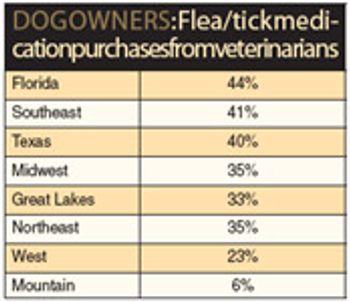
Share this advice with clients to help make sure their pets arrive safely at their destination.

Share this advice with clients to help make sure their pets arrive safely at their destination.

A new survey details how your clients care for their pets-and may offer clues about how you could serve them better.

Sometimes clients need a few words of advice. Here's how to respond when they ask for your personal opinion.

Dr. Jim Guenther offers guidelines for discussing equine herpesvirus with clients.

Make sure you and your clients are prepared for the next catastrophic storm.

Have your clients fill out this form very time they visit and track your patients' anxiety from the start.

Share these tips with clients during Adopt-A-Cat Month and you may receive a few new patients.

Some highly scientific types may disagree, but I'm convinced it was no coincidence that my dog's skin condition relapsed afer her companion's death.

8 keys for calming cranky clients

As a caring, compassionate veterinary team member, it makes sense that you want to offer discounts to needy or deserving clients. But a little here and there can add up-perhaps to the point of hurting your practice's bottom line.

Dealing with these nightmare clients can turn a great day into a terrible one. But following a few tips can help you get through to them with everyone's smiles-and sanity-intact.

Check out these dramatic dental makeovers.

Pet anxiety causes problems for pet owners. You can help with a behavior program.

Cheap advertising-and improved client communication-is just a click away.

Testing for endocrine disorders can be costly to your clients. Explain the process-and the costs-right away to increase compliance.

National Report - Only 30 percent of mixed-breed dogs are on monthly flea-and-tick medications, according to a new survey from Mars Veterinary.

Just 37 percent of dog owners purchase heartworm medication from veterinarians.

As the cost of owning a pet-and running a veterinary practice-rises, more pet owners are turning to insurance to keep their animals healthy.

Talk to your veterinary clients about keeping these medications out of pets' reach to prevent potentially life-threatening effects.

Letting clients know how important they are to you can cement their relationship with your clinic.

In this video interview with dvm360 Content Director Marnette Falley, Dr. Marty Becker talks about one step he thinks he and his colleagues can take to help curb the drop in client visits.

Offer your clients this list of facts to calm their flea allergy woes.

Chapter 4 of a nine-part video series about the Veterinary Care Usage Study by Dr. Karen Felsted, CEO of the National Commission on Veterinary Economic Issues.

'America's Veterinarian' addresses attendees during the CVC in Washington, D.C.

Washington, D.C. -- "I was so nervous, I was sweating like a FEMA director watching the Weather Channel."

Did you know that the #2 search engine in the world didn't exist six years ago? And most people don't even think of it as a search engine! What are we talking about?....YouTube, of course. If you regularly Google your practice's name, you should start doing the same on YouTube! You might just be surprised by what you find.

Social media is a quickly changing and ever-evolving area of the Internet that many practices are embracing in order to market more effectively, and to connect and build stronger relationships with their clients.

Before you jump into using all the tools social media has to offer your practice, it's important to take a step back and develop your practice's social media strategy. What is a social media strategy? Like with any marketing strategy, you need to develop a plan for accomplishing the goals you set forth.

In today's world, you and your veterinary team cannot expect to succeed without an Internet presence. The days of NOT having access to the Internet should be long over, in your mind.

Social media has caused a fundamental shift in the way we communicate. When most people think of social media, they think of Facebook...and they should. If Facebook were a country, it would be the third largest country in the world, right behind China and India.